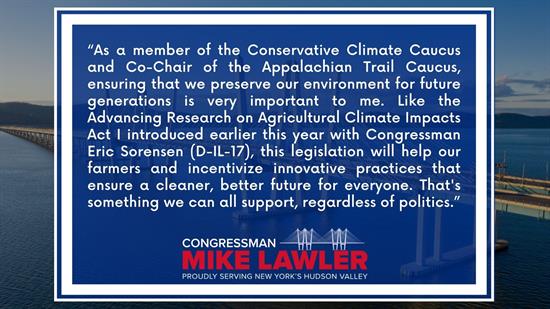Press Releases
REPS. LAWLER AND SLOTKIN INTRODUCE BIPARTISAN BILL TO REDUCE EMISSIONS AND NUTRIENT POLLUTION
Washington, DC,
October 12, 2023
This week, Congressman Mike Lawler (R-NY-17) and Congresswoman Elissa Slotkin (D-MI-07) introduced bipartisan legislation to reduce carbon emissions and nutrient pollution. The bill, the Conservation and Regenerative Optimization Practices (CROP) for Farming Act, would prioritize payments from the Environmental Quality Incentives Program (EQIP) to farm efforts that reduce nitrous oxide and methane emissions and store carbon in soil and plants. Between 2017 and 2020, only 23% of EQIP payments were allocated to practices that mitigate pollution. The CROP for Farming Act is a House companion bill to legislation introduced in the Senate by Senators Tom Carper (D-DE) and Mike Braun (R-IN). It has been endorsed by a number of organizations and individuals across the political spectrum. "As a member of the Conservative Climate Caucus and Co-Chair of the Appalachian Trail Caucus, ensuring that we preserve our environment for future generations is very important to me," said Congressman Lawler (NY-17). "Like the Advancing Research on Agricultural Climate Impacts Act I introduced earlier this year with Congressman Eric Sorensen (D-IL-17), this legislation will help our farmers and incentivize innovative practices that ensure a cleaner, better future for everyone. That's something we can all support, regardless of politics." "Regenerative agriculture is an important tool that helps our farmers be more sustainable, so it’s just common sense that we encourage its use, and this legislation does exactly that," said Congresswoman Slotkin (MI-07). "Expanding federal assistance for reducing nitrous oxide and methane emissions and storing carbon in soil and plants is a simple incentive that will help our environment and put money back into the pockets of Michigan farmers. The CROP for Farming Act is smart, bipartisan legislation that deserves a place in this year’s Farm Bill." "America's farmers are at the forefront of conservation and climate change mitigation. They're leading the way on innovative solutions that increase the productivity of their land while reducing emissions and sequestering carbon. The American Conservation Coalition Action (ACC Action) and our thousands of young conservative leaders nationwide applaud this effort to continue empowering farmers to be part of solving our greatest environmental challenges," said Christopher Barnard, President of American Conservation Coalition Action. "America's farmers and ranchers are undertaking innovative approaches to become more resilient and help address climate change, but they need federal conservation programs to better support their efforts. The CROP for Farming Act would help producers across the country adopt regenerative agriculture practices that will improve soil health, leading to countless other benefits for farmers, consumers, communities, and ecosystems," said Erica Campbell, Policy Director for Kiss the Ground. "Earthjustice applauds the Conservation and Regenerative Optimization Practices (CROP) for Farming Act, a bill that acknowledges that farmers are both stewards of our land and critical partners in environmental protection. This bill is a pivotal step to extend a helping hand to farmers and empowering them to embrace regenerative practices and continue their legacy of sustainability. It's a resounding win for both the agricultural community and the health of our planet," said Ranjani Prabhakar, Senior Legislative Representative at Earthjustice. “Our farmers are already feeling the effects of climate change and are already adopting common sense practices that will reduce greenhouse gas emissions, build soil carbon, and make their farms better able to withstand extreme weather," said Scott Faber, Senior Vice President for Government Affairs of the Environmental Working Group (EWG). "The CROP for Farming Act will make these common sense practices a bigger priority for USDA’s biggest working lands conservation program and ensure that USDA is supporting our farmers when they take steps to combat the climate crisis. EWG applauds Reps. Lawler and Slotkin for making our farmers and the environment a priority for the Farm Bill." "From this summer's floods in Vermont to the heatwaves scorching the Midwest and Southeast, working farmers are already on the frontlines of the climate crisis. Farmers should be equipped with powerful tools that help them store carbon and cut climate pollution like methane and nitrous oxide. That's why we need the Conservation and Regenerative Optimization Practices (CROP) for Farming Act, which will reform the EQIP Conservation Incentive Contracts to do just that," said Mattea Mrkusic, Policy Lead for Energy Transition at Evergreen Action. "The CROP for Farming Act enables more farmers to be even better stewards of their land. The CROP for Farming Act is a win/win for farmers and environmentalists. It provides more options for farmers to reduce emissions from the potent greenhouse gases methane and nitrous oxide, and to store carbon on their lands," said Marianne Krasny, Director of Outreach and Food Policy, Climate Action Now. The following organizations have endorsed the CROP for Farming Act: Alliance of Nurses for Healthy Environments American Bird Conservancy American Conservation Coalition Action Carbon Advocacy Project Carbon180 CCAN Action Fund Chilis on Wheels Climate Action Now Earthjustice Elders Climate Action Environmental Law & Policy Center Environmental Working Group Evergreen Action Farm Action Fund Illinois Environmental Council Interfaith Power & Light Kiss the Ground Michigan Clinicians For Climate Action Missouri Coalition for the Environment Northeast Organic Farming Association-Interstate Council PA- Jewish Earth Alliance Potomac Riverkeeper Network Rachel Carson Council Santa Cruz Climate Action Network Shenandoah Riverkeeper Sierra Club Unitarian Universalist Ministry for Earth Unitarian Universalists for Social Justice The legislation is reprinted here. |




